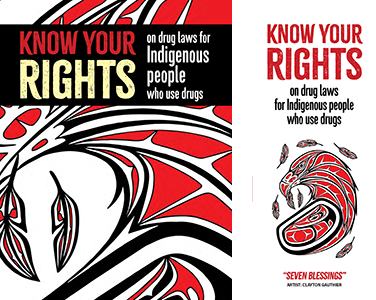Overview
Imprisonment. Lack of culturally appropriate access to health services and resulting poor health. Poverty.
Each of these factors increases a person’s risk of contracting HIV — and in Canada, Indigenous people suffer disproportionately from all of them
We’ve collaborated with Indigenous organizations across the country since 2001 to respond to HIV on two fronts:
- in marginalized populations in which Indigenous people are overrepresented, such as prisoners and drug users, and
- in Indigenous communities, where discrimination, inadequate funding and inconsistent quality of HIV programs and services all remain problematic.
Learn more:
Securing Rights – 2024/25 Annual Report
We hope you’ll read our 2024-25 annual report — Securing Rights: Using Our Values to Meet the Moment — to find out more about the kind of positive change we’re making and get a glimpse of what we hope to accomplish in 2026.
It’s Not So Simple
It’s Not So Simple: The impact of simple drug possession and trafficking offences on health equity builds on research demonstrating the many harms resulting from laws and policies that punish people who use drugs by specifically examining the consequences of recent shifts in how police and prosecutors pursue and lay drug possession and trafficking charges. … Read more
Hard Time Persists: Healthcare and Harm Reduction in Canada’s Prison System
In 2007, the HIV Legal Network (Legal Network) published Hard Time: HIV and Hepatitis C Prevention Programming for Prisoners in Canada, exploring health and harm reduction policies and practices in Canada’s provincial, territorial, and federal prisons. Then, as now, the Legal Network confirmed that everyone benefits from improved healthcare in prison, and that imprisonment is … Read more
Shelter Right: A Blueprint for Inclusive Shelters in Canada
Shelters are more than temporary accommodation. They are essential services. They represent a safe space and a lifeline for many — and especially people who use drugs, who are overrepresented among people who are homeless and grappling with Canada’s toxic drug crisis. Shelters often connect people to vital services that are otherwise out of reach, … Read more
UNDRIP Action Plan – CAAN & the HIV Legal Network
kiskinohtahêw (s/he guides someone) proposing a legal remedies action plan to support and implement the United Nations Declaration on the Rights of Indigenous Peoples (UNDRIP) in alignment with Canadian law This action plan outlines specific measures to ensure that Canada’s laws are consistent with the UN Declaration on the Rights of Indigenous Peoples, based on … Read more
HIV, Hepatitis C and Sexually Transmitted and Blood-Borne Infections in Canada: Top Election 2021 Issues
Joint press release: HIV, Hepatitis C and Sexually Transmitted and Blood-Borne Infections in Canada: Top Election 2021 Issues Health and human rights groups identify priorities for federal policymakers as people in Canada head to the polls Tuesday, September 14, 2021 – More than 60,000 people are currently living with HIV in Canada, approximately 13% of … Read more



